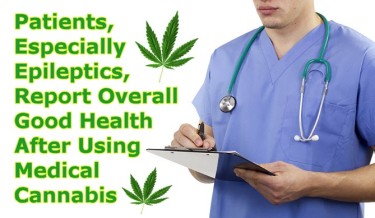
Epileptic seizures decrease 86% with whole plant cannabis extracts in new medical study
A small study done in children with treatment-resistant epilepsy found that cannabis therapies using whole plants reduced seizures by up to 86%. This study was recently published by the journal BMJ Pediatrics Open.
To conduct the study, retrospective clinical data was collected from researchers from clinicians and caregivers of 10 children with drug-resistant epilepsy. The researchers ensured that the 10 patients enrolled for the study had not responded to CBD products. The recruited children were on average six years old, but between 1 and 13 years of age. These children had a range of epilepsy and various types of coexisting problems such as learning ability, global developmental delay, and infantile convulsions.
Research followed, and patients were given a whole-plant cannabis oil containing CBD, THC, and other cannabinoids. Compounds such as flavonoids and terpenes were also found in whole-plant cannabis oil. After conducting the study, it was found that the frequency of patients’ seizures decreased by almost 90%.
The study authors officially reported that the frequency of seizures was reduced by 86% in all 10 patients without any adverse side effects. Each patient’s doctor determined the dosage of cannabis oil that was given to the children. On average, each patient’s children received approximately 5 mg of THC daily, although none of the patients got high from the education.
Parents were also involved in the study, as they shared the results with the researchers either via video conference or phone calls. Some side effects, such as excessive fatigue, were initially recorded before an exact dosage was established. In constitutional states, research has been going on for years as to which marijuana strains are best suited for epilepsy.
One of the study authors, Rayyan Zafar, reported that all of the parents found that the children were well tolerated by the whole plant cannabis products. The parents confirmed that their behavior, mood and also their cognitive abilities improved significantly.
The study also shows that the use of whole plant cannabis oil resulted in a drastic reduction in the use of other prescription drugs by patients. At the start of the study, patients took several medications daily, a number that was drastically reduced once treatment with cannabis oil began. The researchers reported that patients’ anti-epileptic drug use decreased from an average of seven to one once treatment with cannabis oil began.
Researchers support improved access to cannabis therapies
In 2018, Sajid Javid, the UK’s Home Secretary (currently Secretary of State for Health and Social Affairs) stated that medical cannabis would be made available to patients. However, only a handful of patients have received cannabis medication from the National Health Service.
The study’s authors also pointed out the study’s financial implications. They reported a total monthly cost of £ 874 to purchase these cannabis drugs through private descriptions. The authors believe the study provided enough data on whole plant cannabis therapies. They believe these data can serve as evidence for the NHS to adopt such drugs in accordance with these prescribing guidelines. The authors confirmed that such a move will have a major impact on families caring for their critically ill children. Such an NHS move will save families from the financial burdens associated with medication, including the psychological stress of caring for the children.
Parents warn against unsupervised cannabis treatment during seizures
American Epilepsy Society spokesman and a neurologist at Phoenix Children’s Hospital, Dr. Kevin Chapman, parents warned sternly. He claimed that parents should not try any form of self-medication with cannabis oils on their children. He confirmed that the product is still “buyers attention”. According to him, there is still insufficient evidence to support the use of cannabis products as a substitute for prescribed epilepsy treatments.
The study’s authors have admitted that treating children with psychoactive compounds carries some risks. However, they also found that the usual epilepsy drugs also had serious side effects. Dr. Peter Grinspoon, a family doctor at Massachusetts General Hospital in Boston, made some important comments. He noted that concerns about the side effects of cannabis therapies on children should also be considered in relation to risks associated with other commonly used drugs.
Grinspoon also confirmed in an interview with UPI that there should be some general skepticism about the use of THC in children. And these parts should be reassured by reducing the use of anti-epileptic drugs, many of which have serious side effects. He said it was easy to see why parents actively support the use of cannabinoids to treat epilepsy in children.
Researchers on the study also reported that a blend of cannabis oil and individual dosage was adjusted by their doctors for each patient. Each of the patients was also instructed not to administer the drug without adequate supervision.
Zafar also mentioned that medical supervision is very important. The researchers have encouraged parents with children suffering from treatment-resistant epilepsy to go to clinics. They can then discuss the cannabis treatment plan with their doctors.
Several limitations and limitations of the study were also identified by the study authors. These limitations include the use of retrospective data and data that rely on nurse callbacks. However, during the study, parents usually keep diaries to record the seizures as they occurred. The authors also noted that there was no randomization in the research. In addition, no placebo group with which the results are compared was included in the study.
The researchers also mentioned that the experiment’s small sample size was also a limitation in itself. However, they indicated that the results are in line with other studies as well. The researchers have also asked that further studies be conducted on whole-plant cannabis extracts for the treatment of epilepsy and the resultant seizures.
Conclusion
This little study has certainly shed new light on the benefits of cannabis extracts and products. Hopefully the NHS will consider cannabis products as part of these prescribing guidelines. Not least in the interests of families with children who suffer from therapy-resistant epilepsy.
MORE ABOUT MARIJUANA AND EPILEPSY READ THIS …

WHOLE PLANT CANNIS FOR EPILEPSY, PATIENT APPROVAL!
OR..

FDA APPROVED EPIDOLOX, CANNABIS-BASED MEDICINE!

Post a comment: